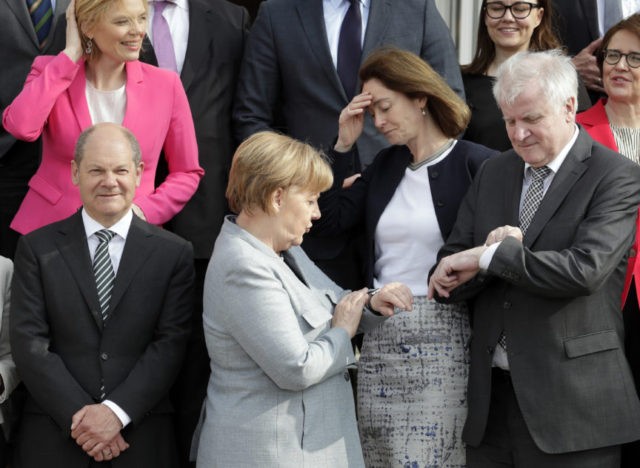BERLIN (AP) — Chancellor Angela Merkel’s Bavarian allies were expected Monday to decide how far to push in a dispute with the German leader over migration, a conflict that has escalated into a threat to her government.
Interior Minister Horst Seehofer is calling for Germany to turn back at its border migrants previously registered as asylum-seekers in other European countries. Merkel opposes unilateral action, arguing that it would weaken the 28-nation European Union.
Seehofer heads the Bavaria-only Christian Social Union, the sister party to Merkel’s Christian Democratic Union. The CSU is determined to show that it’s tough on migration as it faces a challenging October state election in Bavaria, and argues that that is the best way to cut support for the far-right Alternative for Germany.
A CSU leadership meeting Monday in Munich is likely to authorize Seehofer to go ahead with his plan — but it’s unclear at what point leaders want it to take effect. If Seehofer actually goes ahead and implements it unilaterally in defiance of Merkel, it could set off a chain of events that would bring down Germany’s coalition government.
A top CSU official deflected questions ahead of Monday’s meeting as to whether the CSU will give Merkel two weeks to seek a European solution to the issue, which would lower the political temperature. She has meetings planned this week with the leaders of Italy and France, and an EU summit is scheduled June 28-29.
“We as the CSU leadership will certainly give Horst Seehofer full support for what he plans, what he considers necessary,” the party’s general secretary, Markus Blume, told ZDF television.
In an op-ed piece for the daily Frankfurter Allgemeine Zeitung, Seehofer said he “must have the right to turn back” people who aren’t entitled to enter.
But he said the aim should be a “consensual solution” and wrote that it was “of decisive significance that the EU summit at the end of June finally makes decisions that recognize Germany’s burdens in migrant policy.”
Merkel’s CDU was holding a separate leadership meeting Monday in Berlin.
However it ends, the spat has laid bare deep tensions in a fractious government that took office only in March, after nearly six months of postelection haggling, and exposed the limits of Merkel’s authority. The two conservative parties govern with the center-left Social Democrats.
Seehofer and Merkel have long had an awkward relationship. In his previous job as Bavarian governor, Seehofer was one of the leading critics of Merkel’s decision in 2015 to leave Germany’s borders open as migrants streamed across the Balkans. Most first arrived in Bavaria, which borders Austria.

COMMENTS
Please let us know if you're having issues with commenting.